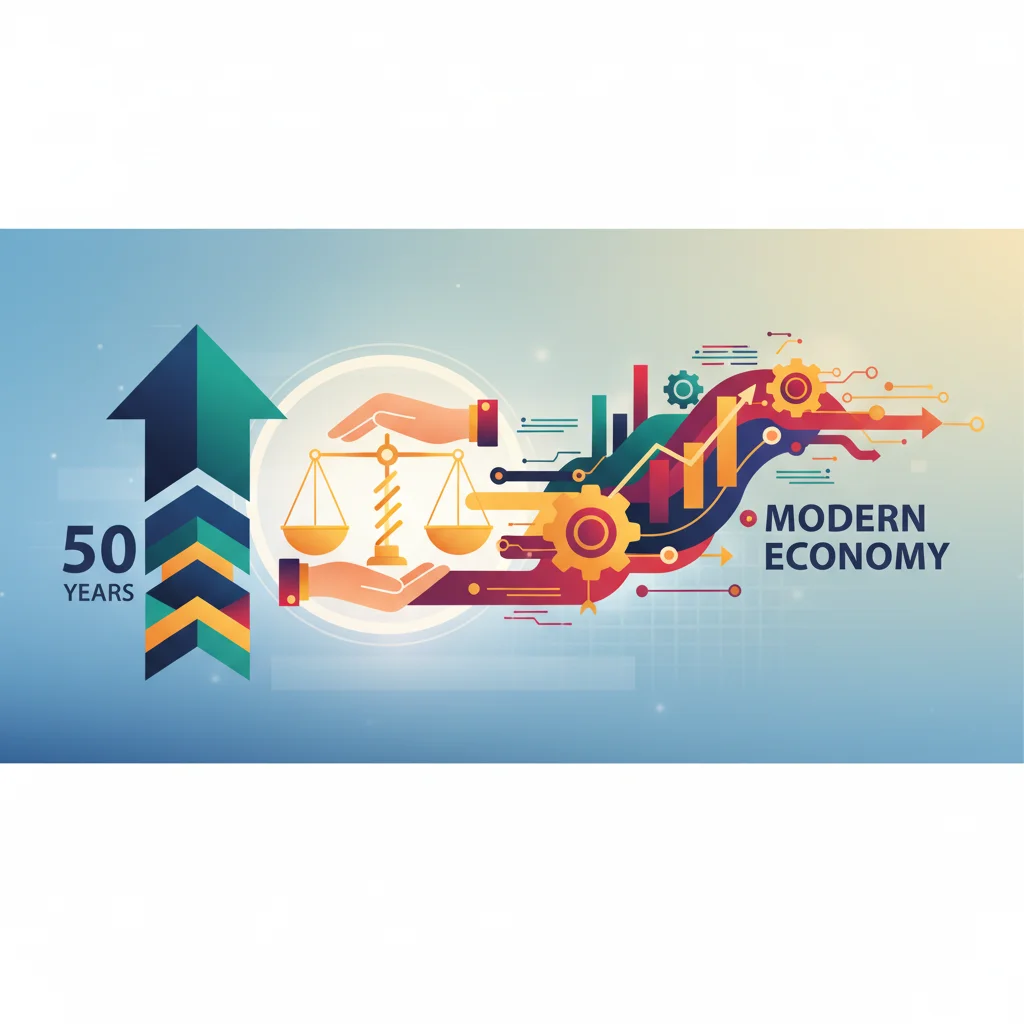
The 50-Year Investment: What a Decades-Long Fight for Justice Teaches the Modern Economy
In the pages of the Financial Times, amidst complex analyses of the stock market and global economy, a short, poignant letter to the editor recently stood out. Authored by Mickey Kelly MBE, it contained a simple yet profound assertion: the families of the Bloody Sunday victims are the “real heroes” for their near 50-year, dignified, and determined campaign for justice (source). The letter, in its entirety, is a testament to human resilience and the unwavering pursuit of truth against seemingly insurmountable institutional inertia.
At first glance, this subject may seem worlds away from the fast-paced domains of finance, investing, and financial technology. Our world is one of quarterly earnings reports, high-frequency trading, and disruptive innovation measured in months, not decades. Yet, within this story of a half-century struggle lies a powerful and essential allegory for the principles that build true, sustainable value in the modern economic landscape. The perseverance of these families offers a masterclass in the concepts that every investor, executive, and innovator should hold dear: the power of a long-term vision, the non-negotiable value of transparency, and the ultimate economic benefit of prioritizing people and principles over short-term expediency.
This is not a political commentary, but an economic one. It is an exploration of how the very qualities that defined this campaign—patience, integrity, and a focus on a just outcome—are the same qualities that separate fleeting market success from enduring enterprise value. What can we, as leaders and participants in the global economy, learn from their playbook?
The Ultimate Long-Term Investment: Patience, Conviction, and Compounding Trust
In today’s market, investors are often lured by the siren song of quick returns. The rise of meme stocks and the volatility fueled by social media-driven trading can make a “buy and hold” strategy seem archaic. Yet, the most successful investors in history, from Warren Buffett to Benjamin Graham, built their fortunes on a foundation of patience and conviction. They understood that true value, like trust, compounds over time. The families’ 50-year campaign is perhaps the most profound human example of this principle. It was an investment of time, emotion, and resolve, with a return that could not be quantified on a balance sheet: truth and accountability.
This long-term perspective is a direct challenge to the short-termism that plagues corporate culture and the stock market. Pressure to meet quarterly targets can often lead to decisions that boost immediate profits at the expense of long-term health, such as cutting R&D spending, neglecting employee development, or compromising on quality. According to a McKinsey study, companies that operate with a true long-term mindset consistently outperform their peers, delivering higher revenue, earnings, and market capitalization growth over time.
The lesson here is clear: whether you are building a portfolio, a company, or a campaign for justice, the strategy cannot be based on the whims of the day. It must be rooted in a core thesis and an unwavering belief in the eventual outcome. For the investor, this means weathering market downturns with a focus on fundamentals. For the CEO, it means investing in innovation and people, even when it doesn’t immediately reflect in the next earnings call. The “heroism” lies in maintaining that conviction when it is most difficult.
The 500-Year Portfolio: What a Tudor Mansion Teaches Us About Modern Investing
Corporate Governance as a Campaign for Truth: The Value of Transparency
At its heart, the Bloody Sunday families’ campaign was a fight for an accurate accounting of history—a battle against a flawed narrative perpetuated by a powerful institution. This quest for truth has a direct parallel in the world of finance and banking: the critical importance of transparent and ethical corporate governance. When a company’s leadership is not transparent, the entire economic ecosystem suffers. Investors make decisions based on incomplete or misleading information, employees lose faith in their leaders, and public trust erodes, sometimes with catastrophic consequences.
We need only look at the collapses of giants like Enron, or more recently the German fintech firm Wirecard, to see the devastating cost of opacity. In the case of Wirecard, a complex web of deceit allowed the company to inflate its value, misleading investors, regulators, and the market for years. The eventual discovery of a €1.9 billion hole in its accounts led to one of Germany’s biggest corporate scandals, wiping out billions in investor capital and severely damaging the reputation of the country’s financial regulators (source). The pursuit of the truth by journalists and whistleblowers in that saga mirrors, in a different context, the long fight for an honest record of events.
This is where emerging financial technology, particularly blockchain, offers a compelling vision for the future. Blockchain’s core proposition is a decentralized, immutable ledger—a “single source of truth.” By creating transparent and tamper-proof records of transactions and ownership, this technology has the potential to revolutionize everything from supply chain management to corporate voting, drastically reducing the potential for fraud and misinformation. It represents a technological solution to a fundamentally human problem: the temptation to obscure the truth for personal gain. Investing in robust governance and transparent systems isn’t a cost center; it’s a fundamental investment in resilience and long-term credibility.
From Shareholder Primacy to Stakeholder Justice: Redefining the “Win”
For decades, the dominant theory in Western economics, championed by Milton Friedman, was shareholder primacy: the idea that a corporation’s sole social responsibility is to increase its profits for its shareholders. The families’ campaign, however, was not solely about financial compensation; it was about dignity, acknowledgement, and a sense of justice for a community. This highlights a critical shift occurring in modern capitalism—the move from a narrow focus on shareholders to a broader consideration of all stakeholders: employees, customers, suppliers, and the community at large.
This stakeholder capitalism model, often linked with ESG (Environmental, Social, and Governance) principles, argues that a company’s long-term success is intrinsically tied to the well-being of its entire ecosystem. A business that pays its employees fairly, invests in its community, and treats its suppliers ethically is building a more resilient, innovative, and ultimately more profitable enterprise. Research from the Harvard Business School indicates that firms with strong performance on material ESG issues have better financial performance and are more attractive to investors.
The table below contrasts these two opposing economic philosophies:
| Principle | Shareholder Primacy View | Stakeholder Capitalism View |
|---|---|---|
| Primary Goal | Maximize short-term shareholder wealth | Create long-term value for all stakeholders |
| Decision-Making Focus | Quarterly profits, stock price | Long-term health, sustainability, and impact |
| View of Employees | A cost to be minimized | An asset to be invested in |
| Community & Environment | Externalities to be managed within legal limits | Integral parts of the business ecosystem |
| Measure of Success | Total shareholder return (TSR) | A balanced scorecard including financial, social, and environmental metrics |
Just as the families sought a form of justice that went beyond monetary value, modern corporations are realizing that their “social license to operate” depends on creating value that extends beyond a stock ticker. This is not altruism; it is enlightened self-interest and the future of sound economics.
Conclusion: The Heroism of Principled Endurance
The letter in the Financial Times rightly calls the Bloody Sunday families heroes. Their heroism is not just in their success, but in their endurance. It’s in the quiet, dignified, and relentless pursuit of a just cause over five decades. For the world of finance, investing, and business, this story is more than a historical footnote; it is a foundational lesson.
It teaches us that the most valuable returns are often those that take the longest to mature. It reminds us that transparency and truth are not optional virtues but the bedrock of any stable system, whether it is a justice system or a financial market. And most importantly, it shows us that a myopic focus on a single metric—be it a quarterly profit or a narrow definition of victory—can cause us to miss the larger picture of creating sustainable, multi-generational value.
In your next board meeting, portfolio review, or strategic planning session, it may be worth asking: Are we building something that can withstand the test of a quarter, or the test of decades? The real heroes in the future of the global economy will be the leaders and investors who choose the latter.
Grounded Ambitions: Why UK Aviation Taxes Could Stall Economic Takeoff


